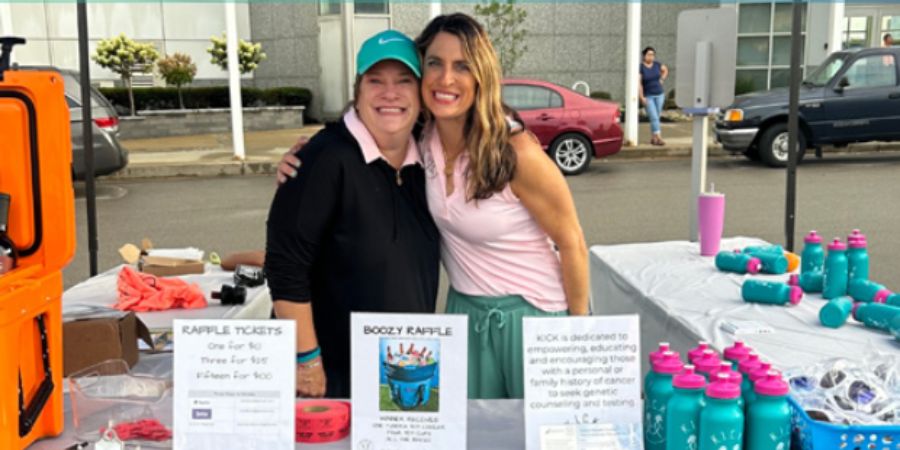What would you do if you could have an accurate picture of your cancer risk?
As genetic testing has evolved, this question has become a reality for more and more individuals. For sisters Colleen Greller and Katie Hernandez (both originally last-named Kickel), the decision to undergo genetic testing altered the course of their lives. Now, they’re united in their effort to make the testing process more affordable and accessible to all.
Colleen and Katie knew early on that their risk for cancer might be elevated after losing an aunt to ovarian cancer in 2000. When a routine mammogram in 2017 led to the discovery of 3 irregular areas, those fears became confirmed. Katie’s physician, Dr. Michael Schultz, recommended further genetic testing, advocating for her to be screened for a BRCA1 genetic mutation. Sure enough, this came back positive – but with that knowledge, Katie was empowered to act. She received a radical bilateral mastectomy (with immediate reconstruction) with bilateral salpingo-oophorectomy (BSO).
For the Kickel sisters, Katie’s discovery and rapid, successful treatment plan was an enormous relief. But in 2020 as the world began to close in on itself due to COVID-19, Colleen learned after a preventative hysterectomy that she had stage 1 ovarian cancer. When performing the procedure at University Hospitals, Dr. Kristine Zanotti was able to tailor Colleen’s examination specifically because of her awareness of the family’s history of the BRCA mutation. Today, both Katie and Colleen are cancer-free.
Many patients affected by ovarian cancer are not fortunate enough to receive such early detection – screening options are particularly low. However, when the level of risk is known through genetic testing, patient outcomes like the Kickel sisters’ are far more likely. Colleen and Katie were inspired to start a foundation to cover the costs of genetic testing for those experiencing financial barriers. “I was talking with my sister on the phone – I talk with her every day,” Colleen said. “And said we have to do something with this genetic testing that saved our lives. And in that twenty-minute phone call, the idea of K.I.C.K. was born.”
Knowledge Is Cancer’s Kryptonite (K.I.C.K.) was founded in 2023, and has since made genetic testing possible for over 300 patients in 48 states. By linking with genetic counselors, K.I.C.K. is able to provide financial relief for tests that allow patients to make informed decisions after understanding their cancer risk.
Colleen shared her perspective on moving through the fear of knowing one’s risk levels. “The biggest lesson I’ve learned is – my sister and I are standing here and can hopefully grow old with our husbands and kids because of this. Our aunt didn’t get that chance. Finding out is something people can have a lot of fear around, and I get that, but knowledge is life- changing.”
Through their advocacy, K.I.C.K. has also partnered with OutRun Ovarian Cancer (OROC), a Northeast Ohio- based nonprofit dedicated to raising funding and awareness for ovarian cancer. To date, OROC has raised more than $2,000,000 since its inception in 2003. Each year, OROC hosts events and fundraising initiatives that uplift survivors and honor the memories of those who have passed on, most notably at an annual 5K Run/Walk event in downtown Cleveland. OROC held its 22nd annual 5K Run/Walk on August 2nd, 2025, drawing more than 1,400 participants.
K.I.C.K. and OROC’s missions align naturally, and through their partnership, both organizations encourage those with hereditary cancer risk to pursue testing and become empowered by information. Colleen and Katie are annual race attendees, there to provide outreach and encouragement to survivors and family members in attendance. At one year’s OROC 5K, Colleen recalls being surprised by a patient who had flown in to thank her for the assistance she received from K.I.C.K. “It was a very tearful moment for all of us,” she said.



